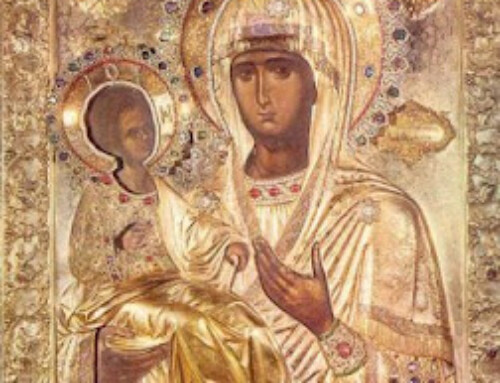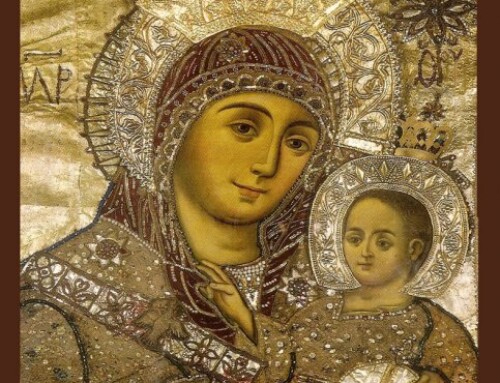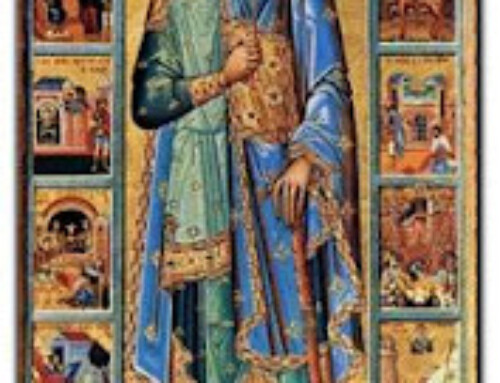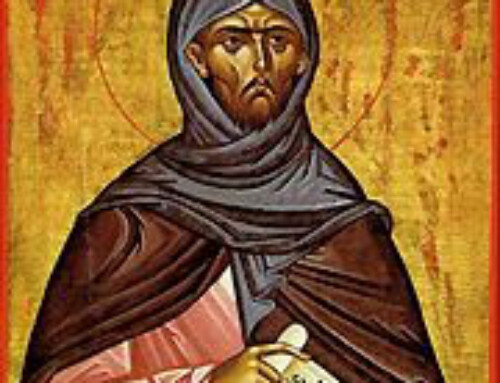THEKLA EQUAL-TO-THE-APOSTLES AND
FIRST-MARTYR
Celebrated on September 14, Thekla is no ordinary saint. Hers is a very ancient Christian story, rooted in the earliest years of the church. From generation to generation, winged words transmitted her story until the second century. At that time, an Asia Minor priest, whose name we do not know, wrote it down in Greek. Later versions in Coptic, Syriac, Ethiopic, Slavic, Arabic and Latin quickly spread Thekla’s fame throughout the Christian world. In Syria, the story of the first Christian woman martyr was added to the Books of Ruth, Esther, Judith and Susanna to form the “Book of Women.”
Saint Thekla was born in Iconium, the capital city of Lycaonia in Asia Minor. The daughter of a noble and distinguished Greek woman named Theokleia, at age eighteen she became engaged to Thamyris, a wealthy Iconian. A well-matched couple though they seemed to be, Thekla and Thamyris never married.
Shortly before the wedding day, Saint Paul arrived in Iconium from Antioch. He was on one of his missionary journeys, going from city to city to spread the good news of the Risen Lord. As usual, the apostle stayed at the home of a local Christian. In Iconium, Paul was the guest of Onesiphoros whose home happened to be located near the house of Theokleia. In the courtyard outside the house, Paul preached the gospel to enthusiastic crowds. People gathered there everyday to hear him. His listeners included many women.
From her window, one day Thekla heard Paul preaching. His message so attracted her that for days after she remained at her window. The young woman refused to leave the window, not even to eat or sleep. She did not want to miss a word. It was as if “strong nails” had fixed her there.
When Theokleia learned of her daughter’s strange behavior, she tried to reason with her. Her pleas, however, failed to move Thekla from the window. In despair, the mother turned to her future son-in-law. Perhaps be could persuade Thekla to listen to reason. But Thamyris also failed to persuade his fiancée to leave her window. Declaring his love for her, he begged Thekla to forget Paul and to proceed with their wedding plans.
His words, however, were all in vain. Like Theokleia, Thamyris did not yet know how radically Paul’s words had affected and changed the eighteen year-old Thekla.
His teachings had in fact turned Thekla into a new person. The young woman no longer recognized the authority of her mother. She decided to disobey Theokleia and to break her engagement to Thamyris.
In addition, Thekla decided never to marry. By her rejection of marriage, she refused to accept the demands of family and society on women. Thekla decided to leave home and follow Paul as his disciple. She chose another destiny for herself.
Frustrated and angry, Thamyris had Paul arrested for disturbing the peace with his subversive doctrines and particularly for inciting women to bizarre conduct. Paul was tried, found guilty of these charges and jailed.
When Thekla learned of this, she determined to go find Paul. She had not yet seen him. She had only heard the apostle from her window.
One night, having bribed the doorkeeper with jewels of gold, she slipped out of the house. A silver mirror, given to the prison guard, enabled Thekla to gain access to Paul. The interview with the eloquent missionary sealed her conversion to the new faith and to an unconventional new life.
The next morning Thekla’s flight was discovered. Learning from a servant where her daughter had gone, Theokleia had her brought home. In the face of Thekla’s obstinate rebellion, her mother now took a drastic step. She asked the governor to burn her stubborn daughter at the stake. Theokleia hoped that this would frighten all those foolish women who had been influenced by “this man” Paul. His teachings, she argued, threatened to tear apart the social order.
The prospect of death by fire did not in the slightest frighten Thekla. She calmly faced her first ordeal. Even as the flames enveloped the young woman, Thekla did not shrink from pain or death. But a miracle saved Thekla. A sudden rainstorm extinguished the burning fire. And Thekla managed to escape unharmed from Iconium, the city of her birth.
Her flight caused much grief. Thamyris wept bitterly at the loss of the woman he loved. Theokleia mourned the disappearance of her only child. And Thekla’s maidservants filled the house with laments. It was as if they were mourning Thekla’s death.
Meanwhile, Thekla found Paul hiding in a cave outside the city. She insisted that she wanted to cut her hair, dress like a man and follow him wherever he went. Thekla also asked to be baptized. Paul, however, not yet sure of her commitment, refused to baptize her.
Later, in a moment of crisis, in the face of death, Thekla baptized herself. Saying the words, “In the name of Jesus Christ I baptize myself,” she jumped into a great pit of water. Although seals swam in the water, once again a miracle saved Thekla from painful death. Lightening struck from heaven and killed the seals that would have devoured her.
Nevertheless, in that cave outside Iconium, Paul accepted Thekla as his disciple and the two of them set out for Antioch.
With this journey from Iconium to the great city of Antioch began Thekla’s long ascetic and apostolic career. It lasted seventy-two years, until her death at the age of ninety.
In Antioch, Thekla encountered more persecution. Alexander, an important local official, fell in love with her at first sight and wished to marry the beautiful young woman. Thekla refused the offer of marriage and publicly ridiculed him. Angry and insulted, Alexander had her arrested.
The governor, who was Alexander’s friend, condemned her to be thrown to the beasts. When the wild animals were released against Thekla in the amphitheater, a fierce lioness ran to her and lay down at her feet. At this sight, the crowd of women who were among the spectators “raised a great shout” of relief and joy. When a bear ran towards Thekla, the lioness killed it.
Next, a ferocious lion was released against Thekla. The friendly lioness fought the lion until both died. At that, the women spectators stopped cheering and mourned. The lioness who had protected Thekla was dead. The saint was now left defenseless, without a protector.
Among the women present was Queen Tryphaena, member of Rome’s imperial family. When she saw the tortures inflicted upon Thekla, she fainted. Thinking that Tryphaena had died, the governor feared reprisals from the emperor. So he ordered Thekla set free. Recovering from her faint, the queen then took Thekla to her home. Tryphaena cared for Thekla as if she were a beloved daughter. In Antioch Thekla thus found a substitute second mother, more loving and understanding than the first.
During the time that she lived with Queen Tryphaena, crowds came daily to see and hear Thekla. Speaking the words she herself had heard from Paul, this young woman disciple converted many of her listeners to Christianity. Indeed, it was said that she had turned Queen Tryphaena’s house into a church. Thus, in Antioch, the city “where they
Dressed in men’s clothing, Thekla then traveled from Antioch to Myra. She had heard that Paul was in that city and she wanted to see her teacher again. At this meeting of teacher and disciple, Paul acknowledged Thekla’s courage and dedication. She had proved to be a disciple worthy of an independent apostolate. So Paul commissioned her to preach the gospel of Christ.
An apostle on her own, Thekla returned to Iconium, the city of her birth. Thamyris had died, but her mother was still living. The daughter hoped for reconciliation with Theokleia and for her conversion as well. Theokleia, however, could not forgive Thekla’s rejection of parental authority and her refusal to marry. Hostile as ever to her daughter’s vocation, Theokleia turned a deaf ear to Thekla’s Christian teachings.
The apostle then left Iconium forever. Thekla went south to Seleukia. A mile outside that city, she found a cave which became her home. She settled there for the rest of her long and active life, teaching, preaching and baptizing. Her holiness, extraordinary virtues and miracles soon attracted followers. Many were aristocratic women, some of whom renounced the world and under Thekla’s guidance led an ascetic life of poverty and self- denial.
There in Seleukia Thekla also gained renown as a healer of sick bodies and souls. Like other apostles, she also exorcized demons. A successful healer who accepted no money, she aroused the antagonism of the city’s physicians. Where they had failed to cure and heal, she always succeeded. Sometimes the sick were healed simply by standing at the entrance of Thekla’s cave.
One day the jealous physicians sent some ruffians to assault her. An old woman of ninety, Thekla could do nothing but pray to God for help. As had happened so often in the past, a miracle answered her prayer. A large rock nearby opened. Thekla jumped into the opening and the rock closed. In this way, the life of Saint Thekla the First-Woman-Martyr ended.
The life Thekla had chosen was radically different from the one planned for her by Theokleia, and from the one approved by society for women. Saint Thekla had openly defied the customs and restrictions imposed on the women of her time and social class. Instead of becoming the wife of Thamyris, a grand lady in Iconium, she followed her conscience. Thekla thereby gained not only autonomy, but sanctity and immortality as well.
The Orthodox Church early recognized Thekla as a saint. Along with a halo, it honors her with several prestigious titles. She is not only called “Great-Martyr” but also “First Martyr.” The latter title, unique among women saints, equates her with Saint Stephen the First-Martyr.
In recognition of her preaching and teaching, the titles “Apostle” and “Equal-to-the-Apostles” were likewise bestowed upon Thekla. Saint Paul himself had predicted that
the successes of Thekla’s apostolate would rival those of the Apostles Peter, Andrew and John. His prediction came true.
Known as “the city of the holy and illustrious virgin Thekla,” Seleukia quickly became the center of her cult. A large magnificent basilica was dedicated to her there, as were two other churches. Constantinople, the imperial capital, likewise had three churches honoring Saint Thekla., the first having been built by the emperor Justinian. Her churches were also to be found in other provinces and cities.
Throughout the Byzantine Empire no name was more glorious. To be called a “second Thekla” was to receive the highest compliment possible for a woman. Imperial princesses were christened Thekla. Nuns chose it for their monastic name. Thekla, a hymn-writing nun of the ninth century in Constantinople, proudly identified with her heroic namesake. Four martyrs, from Palestine, Egypt and Persia, shared the honorable name of the first woman martyr.
Pilgrims of all races from all countries, east and west, traveled to Seleukia to venerate Saint Thekla. At the end of the fourth century, Egeria, a learned and pious Spanish nun, visited the Holy Land. En route home, she stopped at Saint Thekla’s shrine in Seleukia and was impressed to find a woman deacon in charge of several convents and monasteries.
Women monastics in particular revered the memory of Saint Thekla. Fasting all the way, going and coming, two nuns, Matrona and Kyra by name, traveled from Antioch in
Syria to Seleukia. The visit to the great church of Saint Thekla “kindled the fire of love for God” in their hearts. (Saints Matrona and Kyra are commemorated on February 28th.)
Thekla’s power to work miracles did not cease or lessen after her death. One of the forty-five miracles recorded in the fifth century tells how the saint rescued a woman from illiteracy.
Xenarchis, a virtuous married woman, received a book of the Gospels. She was overjoyed to have this precious gift. “But,” she said, “what use is it to me? I don’t know where this flow of words comes from or where it is going.”
At the same time, Xenarchis opened the sacred book, leaning over it as if to kiss it. Hardly had her eyes “fastened on the letters” than she began to read easily and quickly. Saint Thekla had freed her from darkness and helplessness.
From then on, Xenarchis could read for herself the liberating message of the Gospel. Its “flow of words” brought new joy and light into her life.
From Saints and Sisterhood: The Lives of Forty-Eight Holy Women, Page 10 – 17, by Eva C. Topping;
Light & Life Publishing Company, P.O.Box 26421, Minneapolis, MN 55426-0421.





